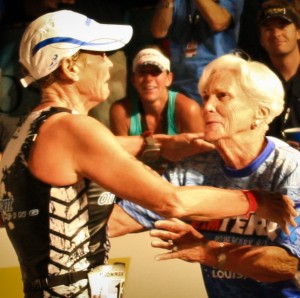Imagine competing in the Ironman—completing the grueling 2.4-mile swim, 112-mile bike ride, and 26.2-mile run (not to mention the hours upon hours of training done in preparation). Even the most seasoned athletes are worn out when they reach the end.
Then, imagine going through treatment for a highly advanced stage of cancer—complete with radiation, multiple rounds of chemotherapy, and invasive surgery. No matter how strong-willed, positive, or healthy you are otherwise, going through that ordeal has got to be the most exhausting thing a person could endure.
Now, imagine doing both at the same time.
It may seem like an impossible feat, but it’s exactly what Teri Griege did. About a month before running her second Ironman in hopes of qualifying for the World Championships, Teri began to notice some bleeding when she went to the bathroom. She wrote it off as an effect of the many hours spent on her bicycle while training, but promised herself that she would get it checked out if it didn’t get better after the race.
Unfortunately, Teri didn’t make the cut for the World Championship at that race, and two weeks later she received a diagnosis of stage 4 colon cancer, which had already spread to her liver. She immediately began year’s worth of intensive treatment, including radiation, 12 rounds of chemotherapy, and surgery on her colon and liver.
But despite all of this, Teri continued training—she still had her sights set on competing in the Ironman World Championship in Hawaii—and emailed the director asking him to help her check this dream off her bucket list. He was moved by her story and invited her to participate as one of the inspirational athletes that year. So, in October 2011, after more than four years of working toward it and after two years of cancer treatment, Teri proudly crossed the finish line at the Ironman World Championship.
Sadly, Teri has not yet crossed the finish line with her fight with cancer—she is still undergoing maintenance chemo and regular scans to ensure everything stays stable. But she’s still running, too, and hopes to have completed all five of the major marathons (New York, Boston, Chicago, Berlin, and London) by mid-2013—no small feat for anyone.
In honor of Colorectal Cancer Awareness Month, I asked Teri to share her experience with the disease (the third most common type of cancer in the U.S.) and how she’s had the super-human strength to keep going in spite of it.
Why did you decide to keep training once you received your diagnosis?
Second, I wanted to prove to my kids that I was going to be okay, that I wasn’t just going to curl up and die. It gave them a feeling of normalcy that I was still fighting and training like I always had.
But finally—most importantly—participating in triathlons is what I love to do. I didn’t want to give up my passion just because of cancer.
What was it like going through training and treatment at the same time? What was the hardest part?
Some days were easier than others. Sometimes I would be able to train as though nothing was wrong and others I would need to break up my workout into smaller increments in order to finish it. Some days it was great and really enjoyable and some days it was tough. But in the end, I would just do what I had to do.
One of the harder times was after I had gotten surgery. I ended up getting an infection and needed to heal, so I couldn’t train for about two months. It was probably my lowest and weakest time—physically, emotionally, and spiritually.
What got you through the rough periods?
My army. I decided after the initial diagnosis that I wasn’t going to hide what I was going through. I wanted to share the story and reach out to as many people as possible for support. So it was this army of family and friends that were on my side all day long and kept me encouraged to keep going.
Was there anything you gained from your training that helped you in your treatment, or vice versa?
An Ironman can take over 12 hours to do, and training is even more of a time and work commitment. Doing all of this probably gave me a mental perseverance and strength that the average person may not have, which certainly helps when going through rigorous treatment. Then again, having this kind of stamina may just be the way I’m built.
Having the cancer, however, has given my racing a new meaning and purpose. I don’t race to be competitive anymore—I’m out there to enjoy it and to spread awareness.
What is the message you hope to spread by sharing your story?
 My first message is that advanced colon cancer is preventable. If you start your screenings at age 50 like you are supposed to (or earlier if you have a family history of the disease), then things can be caught before they progress as far as mine did. The earlier it’s caught, the easier treatment will be.
My first message is that advanced colon cancer is preventable. If you start your screenings at age 50 like you are supposed to (or earlier if you have a family history of the disease), then things can be caught before they progress as far as mine did. The earlier it’s caught, the easier treatment will be.
My second message is a message of hope. Just because you have a diagnosis such as this doesn’t mean you roll over and give up on life. You keep going, keep at it, as much as you can.
And finally I think an important lesson to learn is you can’t go at it alone. Many times it’s hard to ask for help and hard to receive it, but you have to allow yourself to do both of these things—the rewards are countless!
Learn More


